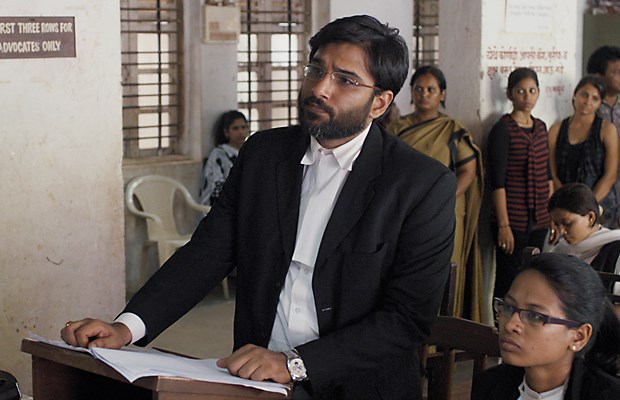Court. Written and directed by Chaitanya Tamhane. Starring Vivek Gomber, Vira Sathidar, Pradeep Joshi and Geetanjali Kulkarni. Rating: 7 (out of 10)
There's much talk in the lead-up to two elections on this continent of the "haves" and "have-nots" and how status parlays into greater justice. Look no further than Chaitanya Tamhane's Court for a reminder of how social inequality and misplaced power plays out elsewhere, in this case in India's lower court system.
Teacher and "people's poet" Narayan Kamble (Vira Sathidar) is a folk singer and activist. "Time to know your enemy" he tells a crowd, criticizing the evils of money and gluttony amidst the iron jungle that chokes modern Mumbai.
Two days after his performance he is brought into custody on a charge of abetment of suicide. A manhole worker from the Sitladevi slums committed suicide two days after Narayan's performance. The link is shoddy, at best; the charge likely fabricated. It's not the first time the old man has been charged with a crime.
Vinay Vora (Vivek Gomber, who also produced) is Narayan's lawyer, specializing in human rights abuses. He becomes the main character in the story after Narayan is locked up, without bail or a guilty verdict, and apparently forgotten about.
Vinay wades through a maddeningly stagnant legal system that has no sense of urgency. The judge (Pradeep Joshi) condenses testimony and tells the court stenographer exactly what to record. He postpones the case several times when witnesses don't show up or are dressed inappropriately.
His boredom echoes how casually life and death situations are handled.
Court proceedings about a stolen watch show how a veneer of politeness belies the sloppy proceedings underneath. The prosecuting attorney (Geetanjali Kulkarni) recites long tracts of obsolete legal precedent that date back to colonial times. Caste prejudice, similar to the Iranian class prejudice at the heart of A Separation, makes a guiltyor-innocent verdict a roll of the dice.
Giving relief to the oppressive atmosphere of the courtroom are vignettes of the lawyers and judge in their daily lives. Vinay can afford to be the people's champion: he comes from a wealthy background and spends his evenings in high-end bars. The public prosecutor is middle class, serving dinner to her family and doing chores before looking over her legal work. And the judge is revealed to be just as old-world and superstitious as the peasant people against whom he discriminates.
But there's no outright villain here: it's the system that fails its people. Tamhane capably and quietly condemns the system with little drama and nary a "you can't handle the truth!" outburst. The arbitrary, documentary feel is no accident, due in part to many in the crew reportedly coming from a documentary background.
In the labyrinthine streets and alleyways of Mumbai there is no surety of justice. "What's the point of being so scared?" sings Narayan, the bravest of them all.
Court screenings are Friday at 8:30 p.m, Sept. 12 at 2 p.m., Sept. 15 at 6:30 and Sept. 16 at 8:30 p.m., all at Vancity Theatre.



